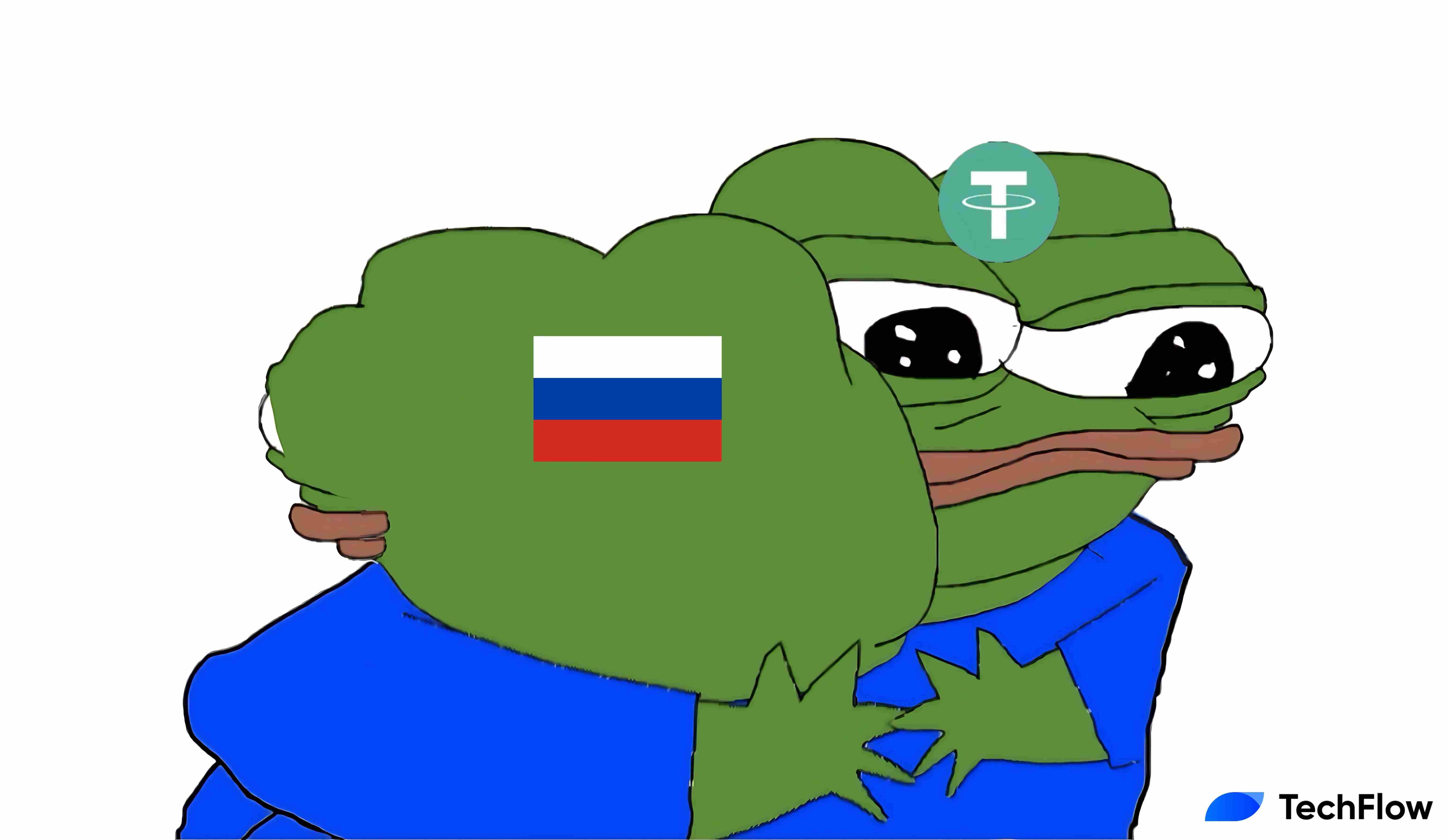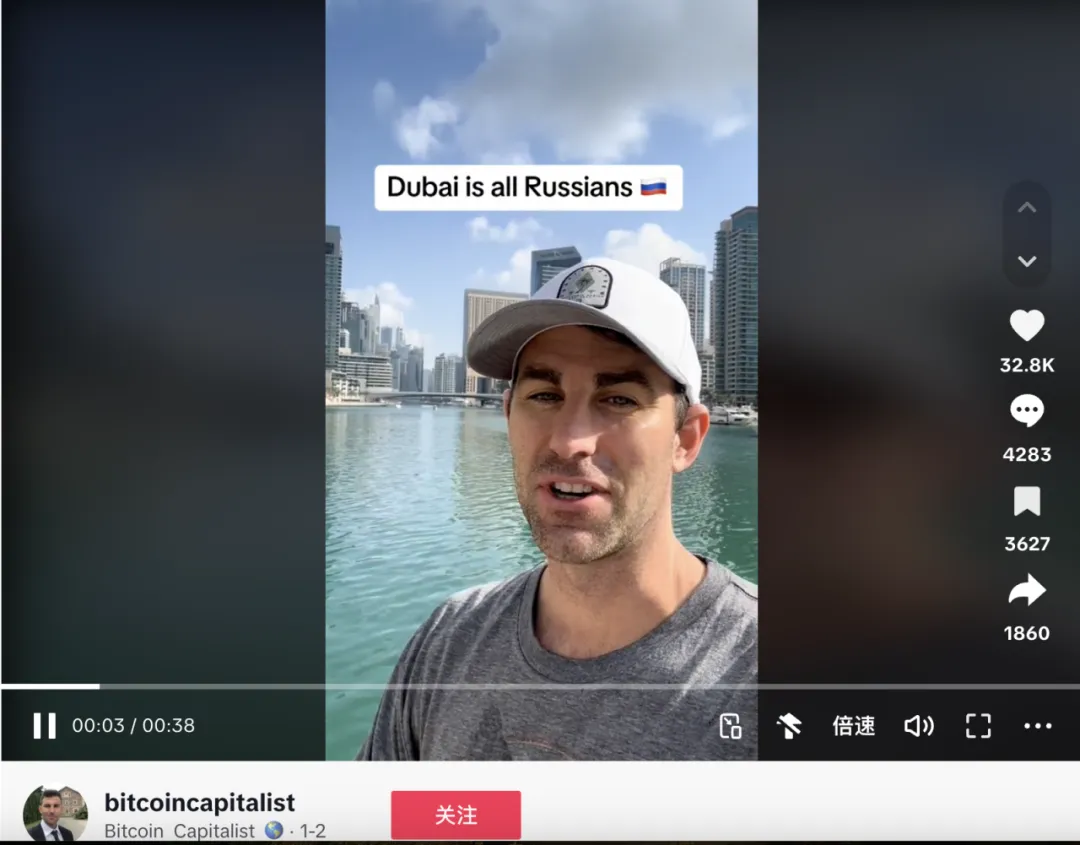Written by: TechFlow

In 2011, Li Xiaolai, who was still a teacher at the time, commented on Bitcoin as "the world rebelled once this thing came out." Bitcoin is the first time in human history that technical means have been used to realize the sanctity and inviolability of private property .
This expression is a bit abstract, but in Russia in 2022, ordinary people have truly experienced the inner meaning of this sentence.
When the stick of financial sanctions fell and traditional financial infrastructure was paralyzed, cryptocurrency became Plan B. Stablecoins such as USDT became the settlement currency for foreign international trade, and a large number of Russian wealthy people used cryptocurrency to transfer wealth.
The Russian government passed legislation allowing the use of digital currencies in cross-border transactions and exchange trading from September 1, 2024, and legalizing cryptocurrency mining in Russia from November .
However, what is unexpected is that Russia’s current cryptocurrency capital is not Moscow, but Dubai, thousands of miles away.
Russia needs cryptocurrency
Under the shadow of the Russo-Ukrainian war, cryptocurrency has found the most fertile soil in Russia and has thrived.
As early as the beginning of the war, according to Reuters, a large number of Russian tycoons brought billions of dollars in cryptocurrencies to Dubai to cash out, and even directly used Bitcoin to purchase local real estate in Dubai, because the UAE did not join the United States and the European Union in imposing economic sanctions on Russia .
Under the financial sanctions of the United States, a large number of European and American companies withdrew from the Russian market and the international banking settlement system failed. At this time, cryptocurrencies represented by USDT came onto the stage.
In April 2024, the U.S. Deputy Secretary of the Treasury made a formal statement to the Senate Committee on Banking, Housing, and Urban Affairs, claiming that Russia was using Tether's USDT stablecoin to circumvent economic sanctions .
Even Chinese businessmen panning for gold in Russia have begun to feel the pulse of Crypto.
After the Russia-Ukraine conflict, European and American countries blocked automobile exports to Russia, and China became Russia's main automobile export destination. A large number of Chinese traders discovered wealth opportunities, and Lin Xiang was one of them.
They usually order ready-made cars in Xinjiang, register them, register them, and buy insurance before canceling the registration. They then export them as used cars. These vehicles are sent to Xinjiang land ports, such as Horgos, and then arrive in Bishkek, the capital of Kyrgyzstan. Since Russia has signed a tariff agreement with Kyrgyzstan, they can enjoy more favorable tariff policies via Bishkek than if the goods are sent directly to Russia. They are then shipped to Russia's central cities of Moscow or St. Petersburg.
For example, the Ideal L9 produced in China is large in size and equipped with a refrigerator, color TV, large sofa, and heated seats. Russians regard it as a "substitute for Land Rover" and it is sought after by Russian tycoons. According to the Ideal Auto national city sales distribution map from January to February 2024 recently published online, the city with the best sales of Ideal Auto in 2024 is not Beijing, Shanghai, Guangzhou or Shenzhen, but Urumqi, Xinjiang.
The Tank 500 and Ideal L9 are sold for around 400,000 yuan in China, but can be sold for more than 9 million rubles (about 700,000 yuan) in Russia.
However, the Chinese traders who made a fortune in Russia also have their own worries, that is, they earned rubles in Russia, and it is not easy to convert them into RMB, and they are easily affected by large fluctuations in the exchange rate. Therefore, they do not want to hold rubles.
As a result, some Chinese traders tried to convert rubles into USDT, or directly receive payment in USDT. This also led to a very hot underground USDT-ruble over-the-counter market. Compared with the USD/ruble exchange rate, the USDT/RUB exchange rate has a premium of about 1%.
Perhaps, you in front of the screen have questions, why not trade directly in RMB ?
Bloomberg published a report in July titled "Direct RMB payments are becoming increasingly difficult, and Russian companies have to take their chances when trading with China," which explained the situation.
Several major Russian commodity exporters said that after the United States expanded the criteria for imposing sanctions in June, direct payments in RMB were increasingly frozen or delayed, making trade with China a matter of chance. U.S. sanctions and the threat of secondary sanctions have made more and more Chinese banks reluctant to make payments and foreign trade settlements with Russia.
Companies that run into problems are often able to find alternative payment methods, such as using cryptocurrencies or routing transactions through former Soviet countries such as Kazakhstan or Uzbekistan, although this can increase costs.
Senior executives of at least two large Russian metal producers have revealed that they have begun using Tether's stablecoin and other cryptocurrencies to settle some cross-border transactions, with most of their counterparties being Chinese customers and suppliers.
The surge in the use of cryptocurrencies has helped Russia circumvent financial sanctions and has prompted the Russian government to begin adjusting its cryptocurrency policy laws to support and encourage cryptocurrencies.
On July 30, 2024, the Russian State Duma passed a law in its second and third readings, allowing the use of digital currencies, including Bitcoin (BTC), Ethereum (ETH) and stablecoins (such as USDT), in cross-border transactions and exchange transactions from September 1, 2024, marking a major shift in Russia's attitude towards cryptocurrencies.
In addition, Russia has passed a law that will legalize cryptocurrency mining in Russia starting in November. Russian legal entities and individual entrepreneurs listed in the register of the Ministry of Digital Development of the Russian Federation will be allowed to engage in crypto mining.
According to Russian media Kommersant, Russia plans to create at least two new cryptocurrency exchanges, one of which is planned to be based on the St. Petersburg Currency Exchange and focus on foreign economic and trade activities; the other is planned to be established in Moscow. The current main idea is to create a stablecoin pegged to the RMB and the BRICS currency basket.
Under financial sanctions, blockchain and cryptocurrency have built a decentralized and relatively censorship-resistant financial infrastructure for Russians at the lowest cost.
It can be said that Russia and cryptocurrencies are now symbiotic.
Dubai, Russia’s Crypto Capital
A little-known fact is that Russia's cryptocurrency capital is not in Moscow, but in Dubai .
The politics here are stable but transparency is low, the sun is bright but the laws are murky, one can get a residence visa by buying a property, and there is no extradition agreement with Europe and the United States. As a result, this place has become the first choice for Russian oligarchs and wealthy people to evade sanctions and transfer wealth, and it is also a paradise for the development of cryptocurrency.
As mentioned earlier, at the beginning of the Russia-Ukraine war, a large number of Russian tycoons brought billions of dollars of cryptocurrencies to Dubai to cash out, and even directly used Bitcoin to purchase local real estate in Dubai, which to a certain extent pushed up Dubai's housing prices.
As a large number of crypto-rich people pour in, a large number of local real estate developers in Dubai are also willing to accept cryptocurrency payments.
For example, DAMAC Properties, a giant real estate developer of luxury homes in Dubai, has accepted cryptocurrencies as a payment method since the beginning of this year. Emaar Properties, the developer of the world's tallest building, the Burj Khalifa, has also begun accepting cryptocurrencies such as Bitcoin and Ethereum as payment for its properties.
In Dubai, because real estate and cryptocurrency are too closely linked, most real estate practitioners have also stepped half a foot into the crypto. In Dubai's crypto activities, real estate people can be seen everywhere, and it has also spawned many crypto projects with Dubai characteristics - Web3 real estate .
For example, there are Dubai Web3 real estate trading platforms HouseLux and Directly. They tokenize Dubai real estate, and investors can directly purchase RWA assets to hold real estate in Dubai.
At the same time, a large number of Russian companies and individuals moved to Dubai.
Today in Dubai, Russians can be seen everywhere, so much so that many permanent residents of Dubai exclaimed that "the Russians have occupied Dubai."

" The number of Russian entrepreneurs and start-ups has increased tenfold compared to last year ," said Jochen Knecht, executive director of Dubai's IFZA, one of many free zones set up to attract foreign investment.
For example, Telegram, a communication software originated in Russia, is headquartered in Dubai. Telegram founder Pavel Durov holds a UAE passport and usually lives in Dubai.
Currently, the core circle of the entire TON ecosystem is also in Dubai .
According to relevant sources, almost all board members of the TON Foundation currently live in Dubai. In addition, the headquarters of TOP (The Open Platform), the core development team of the TON ecosystem, is also located in Dubai, and its founder Andrew is a member of the TON Foundation.
TOP develops and builds multiple tools and projects within the TON ecosystem, such as Wallet in Telegram, as well as the independent wallet TonKeeper and Notcoin with millions of users.
DWF, a well-known Russian-based crypto market maker, also has one of its headquarters in Dubai .
In Dubai, providing crypto financial services to Russian tycoons has become a business. However, this has also caused the United States to begin targeting Dubai companies with sanctions.
In 2023, the U.S. Treasury Department's Office of Foreign Assets Control (OFAC) sanctioned 22 individuals and 104 entities for assisting Russia in evading sanctions. Among them was John Hanafin, the founder of Dubai financial company Huriya Private, who was suspected of helping Russians transfer assets and invest in naturalization. His Ethereum wallet was marked by OFAC, and the address had received approximately $4.9 million worth of cryptocurrencies, most of which were USDT .
At a time when regional conflicts and geopolitical tensions are growing, cryptocurrencies, which are often associated with the gray area, are gradually being tied to the snow-covered country of Russia in a clever and self-consistent way.
The arrest of Telegram's founder in France was interpreted by the outside world as a political game between the West and Russia. Outside the real battlefield, there are many invisible parallel wars. On the financial battlefield, Russia has long been inseparable from cryptocurrency .








